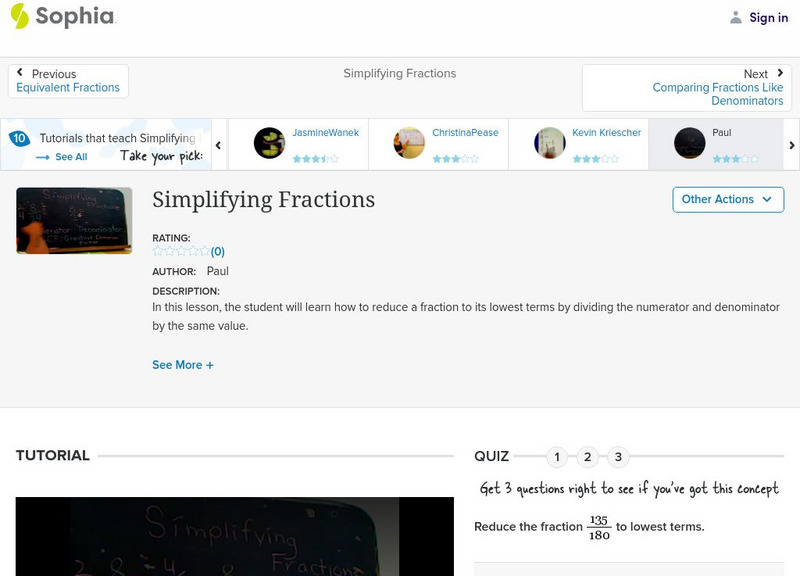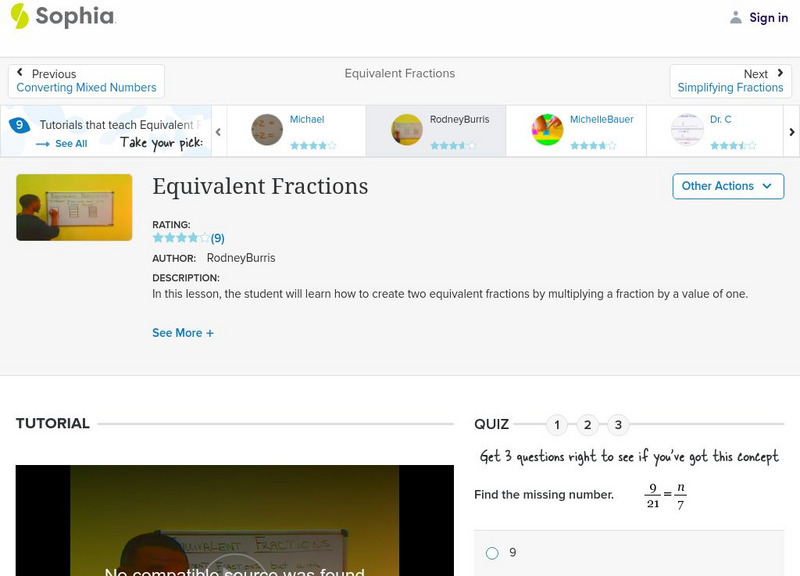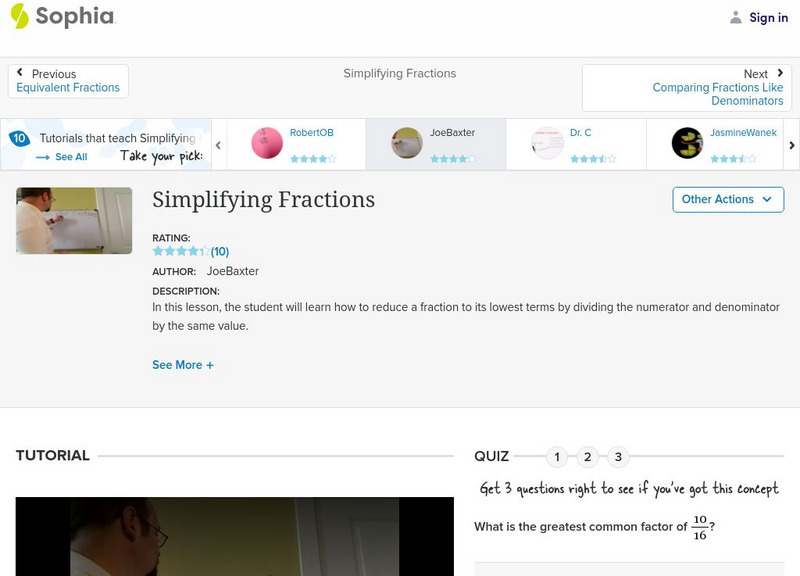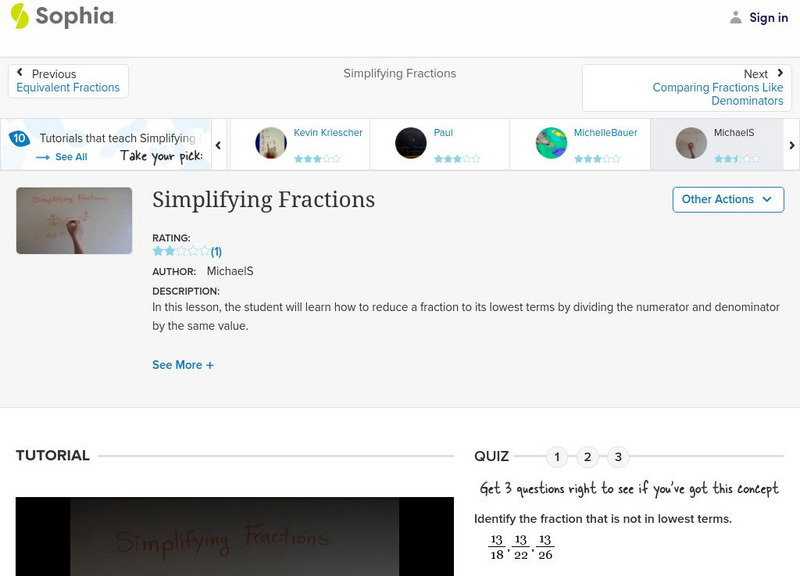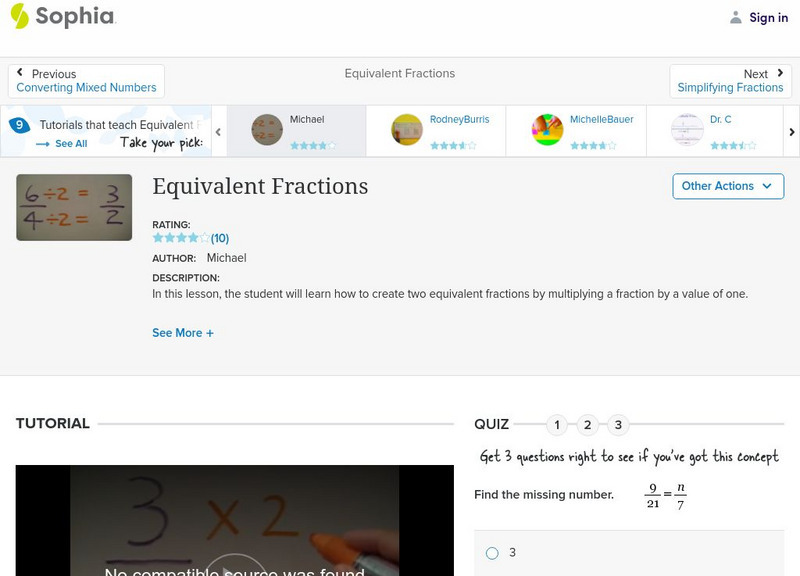Curated Video
Finding the Greatest Common Factor
In this video, students learn how to find the greatest common factor of two numbers by listing factor pairs. The concept is explained through a word problem involving Jon and Elly making treat bags for their class party. The video...
Curated Video
Add Mixed Fractions: Using Improper Fractions
In this video, you will learn how to add mixed fractions with different denominators. By converting the mixed fractions into improper fractions, finding the least common multiple of the denominators, and simplifying the answer through...
Curated Video
Finding Equations for Systems of Equations: An Algebraic Proof
In this video, the teacher explains how to find the equation of another line that passes through the same point where two lines intersect. They demonstrate that the sum of any two equations in a linear system creates another equation in...
Curated Video
Factoring Strategies: Rewriting Expressions
In this video, the teacher explains different strategies for factoring expressions. They review factoring by grouping and factoring a difference of two squares. They also provide examples of factoring expressions completely using these...
Curated Video
Graphing Polynomials: Factoring and Zeros
In this video, the teacher explains how to graph polynomials by finding the zeros through factoring. They discuss the behavior of graphs as x approaches infinity or negative infinity, and how it differs depending on whether the degree of...
Curated Video
Reducing Ratios Using Common Factors
In this video, the teacher explains how to create equivalent ratios by reducing them using common factors. They provide examples and visuals to help students understand the concept.
Bloomberg
How Does Fed Policy Impact the ECB and Other Central Banks?
Apr.26 -- Antonio Garcia Pascual, chief European economist at Barclays, discusses the impact of Federal Reserve policy on the ECB and other central banks. He speaks on "Bloomberg Surveillance."
Curated OER
How Do You Factor the Greatest Common Factor out of a Polynomial?
There are four terms in this polynomial. Find the greatest common factor. Remember to prime factor the number values to help find the GFC. Then rewrite the polynomial in simplest form. Not sure about this skill, then watch the instructor...
Sophia Learning
Sophia: Simplifying Fractions
In this lesson, the student will learn how to reduce a fraction to its lowest terms by dividing the numerator and denominator by the same value. Students can watch a video tutorial and then take an online quiz.
Sophia Learning
Sophia: Simplifying Fractions
In this lesson, the student will learn how to reduce a fraction to its lowest terms by dividing the numerator and denominator by the same value. Students can watch a video tutorial and then take an online quiz.
Sophia Learning
Sophia: Simplifying Fractions
In this lesson, the student will learn how to reduce a fraction to its lowest terms by dividing the numerator and denominator by the same value. Students can watch a video tutorial and then take an online quiz.
Sophia Learning
Sophia: Simplifying Fractions
In this lesson, the student will learn how to reduce a fraction to its lowest terms by dividing the numerator and denominator by the same value. Students can watch a video tutorial and then take an online quiz.
Sophia Learning
Sophia: Simplifying Fractions: Lesson 5
In this lesson, the student will learn how to reduce a fraction to its lowest terms by dividing the numerator and denominator by the same value. It is 5 of 13 in the series titled "Simplifying Fractions."
Sophia Learning
Sophia: Simplifying Fractions
In this lesson, the student will learn how to reduce a fraction to its lowest terms by dividing the numerator and denominator by the same value. Students can watch a video tutorial and then take an online quiz.
Sophia Learning
Sophia: Simplifying Fractions
In this lesson, the student will learn how to reduce a fraction to its lowest terms by dividing the numerator and denominator by the same value. Students can watch a video tutorial and then take an online quiz.
Sophia Learning
Sophia: Simplifying Fractions: Lesson 8
In this lesson, the student will learn how to reduce a fraction to its lowest terms by dividing the numerator and denominator by the same value. It is 8 of 13 in the series titled "Simplifying Fractions."
Sophia Learning
Sophia: Simplifying Fractions
In this lesson, the student will learn how to reduce a fraction to its lowest terms by dividing the numerator and denominator by the same value. Students can watch a video tutorial and then take an online quiz.
Sophia Learning
Sophia: Simplifying Fractions
In this lesson, the student will learn how to reduce a fraction to its lowest terms by dividing the numerator and denominator by the same value. Students can watch a video tutorial and then take an online quiz.
Sophia Learning
Sophia: Equivalent Fractions: Lesson 9
In this lesson, the student will learn how to create two equivalent fractions by multiplying a fraction by a value of one. It is 9 of 12 in the series titled "Equivalent Fractions."
Sophia Learning
Sophia: Simplifying Fractions
In this lesson, the student will learn how to reduce a fraction to its lowest terms by dividing the numerator and denominator by the same value. Students can watch a video tutorial and then take an online quiz.
Sophia Learning
Sophia: Simplifying Fractions
In this lesson, the student will learn how to reduce a fraction to its lowest terms by dividing the numerator and denominator by the same value. Students can watch a video tutorial and then take an online quiz.
Sophia Learning
Sophia: Equivalent Fractions: Lesson 10
In this lesson, the student will learn how to create two equivalent fractions by multiplying a fraction by a value of one. It is 10 of 12 in the series titled "Equivalent Fractions."
Sophia Learning
Sophia: Equivalent Fractions: Lesson 3
In this lesson, the student will learn how to create two equivalent fractions by multiplying a fraction by a value of one. It is 3 of 12 in the series titled "Equivalent Fractions."
Sophia Learning
Sophia: Equivalent Fractions: Lesson 4
In this lesson, the student will learn how to create two equivalent fractions by multiplying a fraction by a value of one. It is 4 of 12 in the series titled "Equivalent Fractions."





